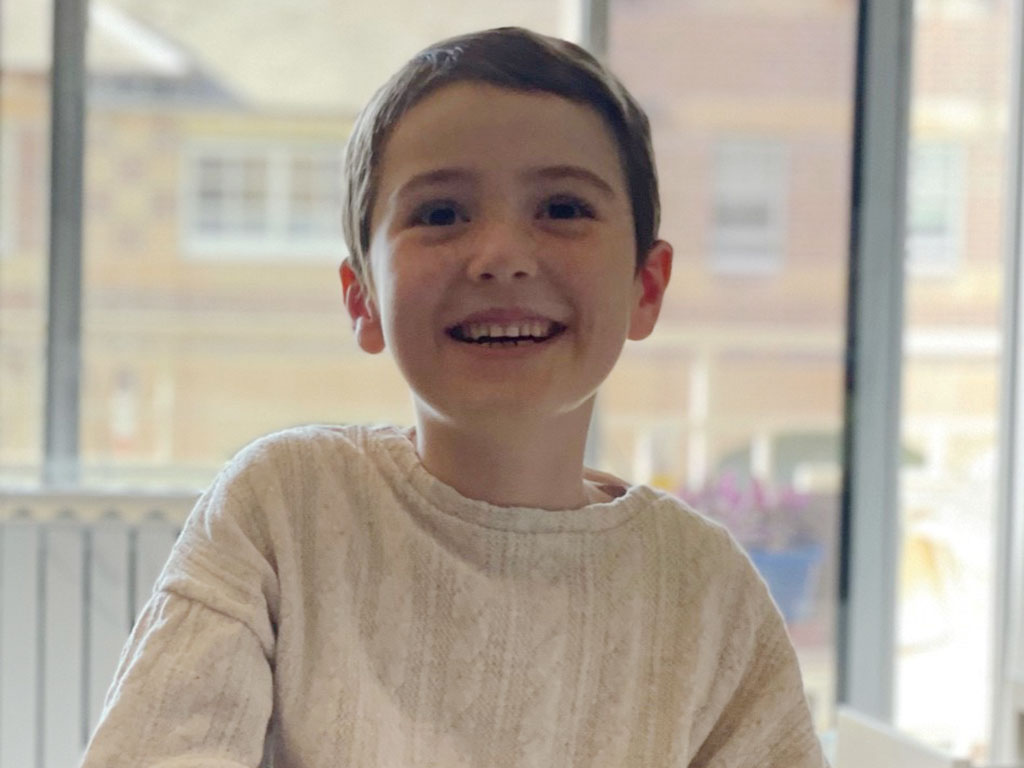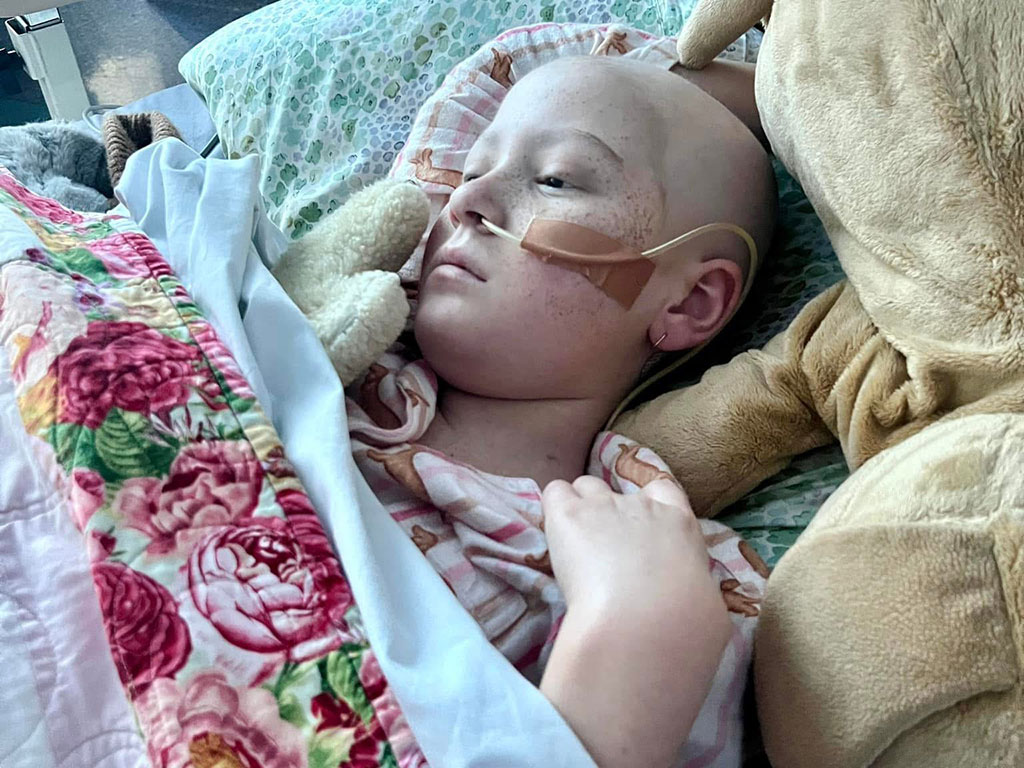The ZERO results really changed the picture for us.
- Laura, Carys' mum
A bright and active little girl, Carys was happy to try anything. But then she fell ill and very nearly didn’t make it to 7 years of age. She recovered only to relapse two years later.

Pre-diagnosis
Carys was a happy child who was sociable and well-liked. Her parents, Mark and Laura, were finding their way, like all new parents, but felt that things were going well.
‘Carys was basically ticking every box, and we were very comfortable with how things were going for her,’ says Laura. ‘She was always bright and eager to please.’

Symptoms
The family was getting ready to fly to Fiji for a much-anticipated family holiday when Carys took ill. First came an ear infection and a trip to the doctor to get antibiotics. Then came nose bleeds, easy bruising, and a complete lack of energy. It was clear something was wrong.
COVID had just hit, and it wasn’t easy to get medical appointments. When Laura took Carys’ little brother Cohle in for his 4-year-old immunisations, she decided to take Carys in as well ‘just for another look.’ The GP told her to go straight to the hospital.
Mark dropped Laura and Carys off. Within an hour, he received a phone call to say: Come back to the hospital; it’s more than just an ear infection.
Diagnosis
At the hospital, blood tests were done on Carys immediately. The results were clearly of concern.
‘They were all exclaiming at the computer and putting their arms up,’ says Laura. ‘It seems her white blood count was the second highest count they’d ever seen.’
As soon as the test results were confirmed, Laura was told her daughter had leukaemia. But she says it wasn’t until later that it really hit her.
‘I think about an hour and a half later I went into shock. I just remember sitting there feeling sick.’
Laura also grappled with anxiety, especially when she thought about how close they were to taking Carys to Fiji.
‘If we’d put her on that plane, she would have died there.’

If we’d put her on that plane to Fiji, she would have died there.
- Laura, Cary's Mum

Treatment
Carys’ white blood cell count needed to come down before chemotherapy could start, delaying treatment.
‘It took her so long to stabilize, we were warned that we might lose her,’ says Laura. But eventually things improved and chemotherapy began.
The first time Carys was able to go home, she developed a temperature and was back in hospital within 24 hours – the start of what became a recurring pattern.
At one point the chemotherapy drugs caused Carys to stop communicating, which Laura describes as ‘traumatic’. Then, during the third round of chemo, Carys’ skin became very flaky and her lips turned black.
However, on the whole, Carys responded well and most side effects were dealt with before they became major problems.
‘At the time it was hell,’ says Mark. ‘It could have gone a lot worse —we never ended up in ICU.’
We were warned that we might lose her.
- Laura, Carys' Mum
Life after treatment
After treatment ended, the family tried to get on with life as best they could.
‘Life after that was really about getting back to normal, or a new normal, and that meant getting Carys back to school,’ says Laura. ‘She was very much enjoying being back with her community of people.’
Everything seemed to be going fine. Weeks turned into months. Months turned into years. Then, on one of Carys’ routine monthly check-ups, a slight irregularity in her blood was picked up.
‘It was decided that we’d go in for testing every two weeks for about six weeks,’ explains Laura. ‘We hadn’t noticed any changes at home, other than that she was sleeping more, and that she sometimes brought her lunch home from school.’
‘Then I got a phone call at work asking me to bring Carys into the hospital for a full day of testing. Late that afternoon, it was confirmed: she had relapsed.’
It was Halloween 2023.

I got a phone call at work asking me to bring Carys into the hospital.
- Laura, Carys' Mum

Relapse
News of the relapse came as a tremendous shock.
‘It had been quite some time since Carys had been sick, around two and half years,’ explains Laura. ‘When she completed treatment the first time, we were told she had a 90% chance of not relapsing. So to find ourselves in that 10% group was just beyond our comprehension.’
‘Getting that news of the relapse is probably the worst thing that’s ever happened to me in my entire life. It was so devastating.’
Carys herself was also having enormous trouble comprehending what had happened, and Laura says took quite a while for her to actually believe them.
‘It was really difficult to re-enter that world knowing we were going to experience what we already had, and probably a worse, much harder journey.’
Once the relapse was confirmed, Laura says things began to happen very quickly.
‘We were informed we were going onto a standard relapse protocol, and it would be much like the first time Carys was sick. We were extremely concerned because she’d had a very high rate of hospitalisation the first time, and that is exactly what happened again. We were in hospital most of summer.’
‘There were a few occasions where she almost died. We were only just holding on.’
The news of the relapse is the worst thing that’s ever happened.
- Laura, Carys' Mum
Joining ZERO
In the first few days of treatment, Laura and Mark signed papers for Carys to be enrolled on the Zero Childhood Cancer Program (ZERO). This meant that whole genome sequencing and other testing would be done to try to find out as much as possible about her cancer.
Early January 2024, Laura recalls their oncologist coming into their room appearing ‘quite shocked.’
The ZERO results had come in, and it seems Carys did not have the most common type of leukaemia, B-cell acute lymphoblastic leukaemia (B-ALL) as had been originally diagnosed. She had a rare subtype of ALL known as Philadelphia chromosome-like acute lymphoblastic leukaemia (Ph-like ALL).
‘The ZERO results really changed the picture for us. Things were now up in the air regarding how they were going to move forward with treatment.’
Unfortunately, being January and peak holiday time, Laura and Mark had to wait some time to learn more about what this discovery would mean for them.
‘Meanwhile, Carys was so unwell,’ says Laura. ‘Again, we were really only just holding on. For much of January and part of February 2024, we thought she was going to die.’

The ZERO results really changed the picture for us.
- Laura, Carys' Mum

Treatment round 2
Eventually, Laura and Mark were told that Carys would be getting chemotherapy, radiotherapy and immunotherapy, followed by a bone marrow transplant.
‘It was extremely tough to go through, but we took it one week at a time,’ says Laura. ‘The side effects were very tough. Carys spent a week intubated in the intensive care unit at one point.’
‘But the treatment went to plan, and she made it through to the other side intact.’
All up, from relapse to discharge, treatment had lasted eight months.
Today
Carys started Year 6 in school this year (2025). Laura says Carys is thoroughly enjoying having her old life back, seeing her friends and making plans. Every month, they visit the hospital clinic for a checkup.
‘The future will always be a little uncertain. We’re confident the transplant has worked, time will tell, but the longer she goes without relapsing the easier life becomes.’
‘We’re now getting back to our old lives and routines, but maybe more with a sense of trying to enjoy the time out of hospital while we can, as we know it’s not a given that we will never need to go back in.’
Laura and Mark are enormously grateful to supporters of ZERO.
‘We want people to know that this program really does have real-world impacts,’ says Laura. ‘Treatment options and outcomes for so many children are radically different because of it.’

How you can help

Give a gift
By giving a gift today, you can make a difference to the lives of children with cancer.

Fundraising and events
Get involved in one of our events or create your own to help find better, safer treatments for children with cancer.

Partnerships
Join our diverse community of businesses, philanthropists and gamechangers, determined to help cure childhood cancer.
Share your story
Have you been touched by childhood cancer and would like to share your story? Please get in touch today.









